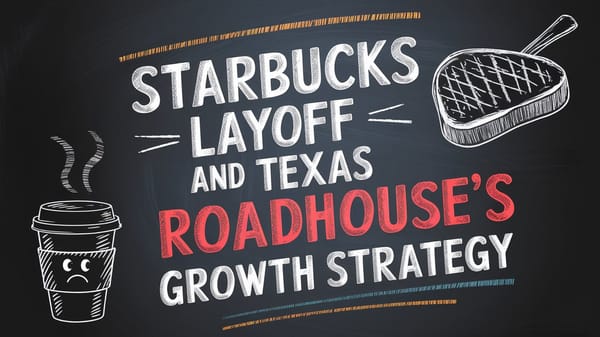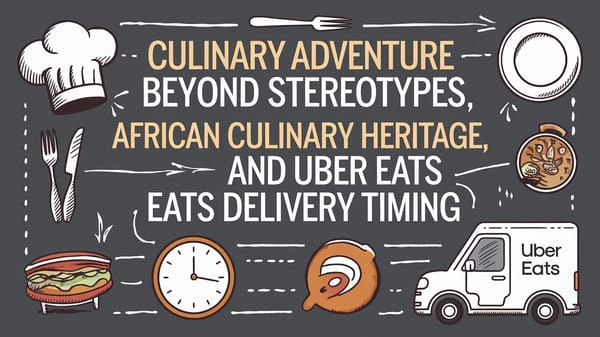October 6th QSR Roundup: Elevating Restaurant Operations: Strategies for Success and Customer Engagement

Now shorter! QSR news for Oct 6th, 2024. We reviewed 20 QSR publications, 6 subreddits, and over 18 articles to bring you the latest. Estimated reading time saved (at 200wpm): 89 minutes. It'll take you about 13 minutes to catch up.
Bridging Platforms with Thanx Connex
Thanx has made a significant stride by launching Thanx Connex, an enterprise-level integration center boasting over 60 pre-built integrations with major platforms. This initiative addresses the critical need for restaurants to have accessible and unified data across various systems. By integrating with essential platforms like POS and CRM, Thanx Connex enables restaurants to streamline operations, reduce administrative burdens, and focus more on customer engagement.
Additional highlights include Thanx achieving SOC 2 Type 2 compliance, which is a testament to their dedication to data security and privacy. In an era where data breaches are a significant concern, this compliance assures clients that their information is handled with the highest level of integrity. This move not only enhances trust with existing clients but also positions Thanx as a reliable partner for new businesses seeking robust and secure integration solutions.
Source: Total Food Service
Restaurant365: Is It Worth the Investment for QSR Franchises?
Restaurant owners are sharing their experiences with Restaurant365 (R365), especially within QSR franchises, bringing to light several advantages and disadvantages:
- Strengths of R365:
- Accounting Efficiency: Some users appreciate the streamlined accounting processes, which can consolidate financial operations across multiple locations.
- Inventory Management: Effective tools for tracking inventory help in reducing waste and optimizing stock levels.
- Recipe Builder: The recipe builder feature allows for precise cost calculations and consistency in menu items.
- Weaknesses of R365:
- Technical Difficulties: Issues with bank reconciliation processes can lead to inaccuracies in financial reporting.
- User Permission Challenges: Inconsistent user permissions may pose security risks and complicate team management.
- Inadequate Reporting: Lack of critical reports makes it difficult to detect fraudulent activities or anomalies in operations.
- High Costs: The investment required for R365 is a significant factor, with some owners feeling that the return doesn't justify the expense.
- Time Investment: Maximizing the platform's capabilities may necessitate dedicating a team member solely to data entry and management.
Owners considering R365 are advised to conduct thorough research, weigh the potential benefits against the costs, and perhaps explore alternative solutions that may better align with their specific operational needs and budgets.
Source: /r/restaurantowners
Boosting Customer Loyalty and Engagement
Maximizing Loyalty Program Success
With the competitive landscape in QSRs, loyalty programs have become a cornerstone for driving customer retention and increasing satisfaction. Strategies that have proven effective include:
- Holistic Engagement: Moving beyond traditional loyalty, integrating engagement tactics like interactive quizzes or challenges can deepen customer relationships.
- Immediate Rewards for Sign-Ups: Offering incentives such as a free appetizer or discount upon joining the program taps into the consumer desire for instant gratification, encouraging sign-ups.
- Streamlined Enrollment: Simplifying the sign-up process—perhaps through social media integrations or minimal required information—reduces barriers to entry.
- Sophisticated Tiered Systems: Implementing bronze, silver, gold levels gives customers goals to strive for, fostering loyalty through a sense of achievement.
- Advanced Personalization: Utilizing data analytics to tailor promotions ensures customers receive offers relevant to their preferences, increasing the likelihood of redemption.
- Robust Mobile Applications: Developing apps that are intuitive and offer features like mobile ordering, reward tracking, and push notifications keeps the brand at the forefront of customers' minds.
- Playful Gamification Elements: Incorporating games or challenges where customers can earn extra points or prizes enhances engagement.
- Cross-Brand Partnerships: Allowing points to be used at partner establishments can widen the appeal of the loyalty program, providing more value to customers.
By adopting these strategies, loyalty programs can significantly enhance effectiveness and boost customer return rates.
Source: QSR Web
Engaging Gen Z with Loyalty Programs
Understanding the nuances of customer engagement versus loyalty is crucial, especially when targeting Gen Z:
- Interactive Engagement: Gen Z values active participation; incentivize them through point accumulation and interactive content such as quizzes or challenges.
- Immediate Rewards Matter: Providing instant benefits upon sign-up ensures customers feel valued from the outset, catering to their desire for quick gratification.
- Simplify the Process: An easy-to-join and operate loyalty program is particularly important in fast-paced QSR environments where convenience is key.
- Leveraging Personalization: Tailor offers using customer data to enhance engagement and encourage repeat business. Personalized promotions make customers feel recognized and appreciated.
- Mobile and Gamification: A seamless mobile experience combined with gamified elements can significantly boost interaction and retention, aligning with Gen Z's tech-savvy nature.
- Social Responsibility: Integrate social causes or environmentally friendly initiatives into your loyalty program to resonate with Gen Z's values.
Emphasizing these aspects can help businesses connect more effectively with younger demographics, fostering both engagement and loyalty.
Source: QSR Web
Navigating Restaurant Ownership and Business Opportunities
Challenges in Securing Restaurant Spaces
Aspiring restaurateurs often face hurdles in finding suitable spaces due to limited listings and zoning issues. Practical advice from experienced owners includes:
- Leverage Existing Spaces: Seek out existing restaurant locations that already meet zoning and health code requirements to save time and resources. This can significantly reduce the initial investment and expedite the opening process.
- Engage Real Estate Professionals: Utilize agents and online platforms to uncover potential opportunities that may not be publicly listed. Agents can provide insider knowledge and access to properties before they hit the open market.
- Franchising Advantages: Consider the benefits of franchising, which can streamline the process by handling permits, zoning, and other logistical aspects. Franchises often have established systems and brand recognition that can aid in early success.
- Learn from Others: Hear from those who have navigated similar challenges. Many owners emphasize that transitioning into an existing space can minimize renovations and compliance issues.
- Persistence Pays Off: The search for the perfect location may be lengthy, but persistence and networking are key in overcoming the obstacles.
Owners highlight that while the process can be challenging, strategic approaches can lead to finding the ideal space.
Source: /r/restaurantowners
Why Start a Restaurant? Owners Share Their Stories
Restaurant owners reveal their motivations for entering the industry, painting a picture of passion, resilience, and diverse inspirations:
- Filling Market Gaps: Many saw opportunities in unmet needs within their communities, such as unique cuisine offerings or lacking dining experiences.
- Family Legacy and Passion: Personal connections, like continuing a family tradition or fulfilling a lifelong dream, often ignited the desire to open a restaurant.
- Career Transitions: Some turned to the restaurant business after facing burnout or dissatisfaction in corporate roles, seeking fulfillment in a more personal venture.
- Overcoming Adversity: Personal challenges, including health issues or personal tragedies, spurred individuals to pursue their culinary dreams as a form of healing or new beginnings.
- Success Stories: Real-life examples include restaurants grossing $1.2 million and becoming debt-free after four years, demonstrating potential rewards despite the industry's demanding nature.
- Mixed Feelings on Repeating the Journey: While some would eagerly start over, others acknowledge the immense commitment required and might hesitate to do it again.
A common thread is the importance of passion in the restaurant business, with many agreeing that while it is hard work, the joy it brings makes it worthwhile.
Source: /r/restaurantowners
Exploring Innovative Business Models
An entrepreneur considers taking over a struggling bar with a strategic plan:
- Adaptation of Space: Transforming the location into a dual-purpose venue—a coffee shop and food truck during the day, while keeping the bar operational at night. This maximizes the use of the space throughout the day.
- Understanding Failures: Emphasizes the need to investigate why the bar struggled initially to avoid repeating mistakes. This includes analyzing financials, customer demographics, and competition.
- Risk Mitigation: Suggests low-cost entry methods like coffee carts and food trucks to test the market without significant upfront investment.
- Diversification: Proposes leasing parts of the space to other businesses, such as allowing food trucks to operate on-premises, which can create a symbiotic relationship and diversify offerings.
- Community Focus: Highlights the potential of creating a community-friendly environment that caters to different customer segments throughout the day, fostering a loyal customer base.
- Advice from Peers: Commenters caution against over-planning and emphasize the importance of understanding the local market and being adaptable.
Feedback from experienced operators underscores the importance of thorough financial analysis and caution in blending day and night operations.
Source: /r/restaurantowners
Operational Challenges and Industry Insights
Navigating Kitchen Floor Regulations in California
Restaurant owners in California grapple with health code requirements for kitchen flooring materials. Key considerations include:
- Polished Concrete Acceptance: Some confirm that polished concrete floors can pass inspections, provided they are sealed appropriately with an FDA-approved sealer.
- FDA-Approved Materials: Flooring must be non-porous, easy to clean, and finished with FDA-approved sealers or epoxy to meet health standards.
- Consulting Authorities: Emphasize the importance of communicating with local health inspectors to ensure compliance, as regulations can vary by county.
- Cove Base Tiles: Installation of curved cove base tiles where floors meet walls is often required to prevent debris accumulation and facilitate cleaning.
- Practical Experiences: Owners share that investing in durable epoxy coatings, rated for 25 years, can meet standards and provide longevity, though costs can be significant.
- Avoiding Porous Surfaces: Materials like unsealed concrete or certain tiles may be deemed unacceptable due to their absorbent nature.
Understanding and adhering to these regulations is crucial to avoid costly modifications and ensure a smooth inspection process.
Source: /r/restaurantowners
Front-of-House vs. Back-of-House Dynamics
Restaurant owners express frustration over the financial disparities between front-of-house (FOH) and back-of-house (BOH) staff:
- Unsustainable Wage Structures: Concerns that FOH staff, buoyed by gratuities averaging 20%, often earn significantly more than BOH employees and even some city officials, leading to wage imbalances.
- Perceived Entitlement: Some owners feel that FOH employees exhibit entitlement, particularly during peak times when staffing challenges are most acute.
- Operational Shifts: Discussions about transitioning to counter service models to mitigate reliance on tipped staff and reduce labor costs.
- Industry Sustainability: Questions arise about the long-term viability of the current tipping system and its impact on restaurant profitability, with some suggesting that it's time to re-evaluate traditional models.
- Owner Experiences: Many share similar sentiments, contemplating immediate changes to labor structures and highlighting the need for equitable pay across all roles.
This discourse reflects a broader industry debate on how to balance fair wages, staff satisfaction, and business sustainability.
Source: /r/restaurateur
Balancing Tech Solutions and Operational Needs
Frustration mounts among restaurateurs regarding tech entrepreneurs proposing solutions without industry understanding:
- Spam and Irrelevant Proposals: Restaurant forums are flooded with pitches addressing non-existent problems, detracting from valuable discussions.
- Lack of Operational Insight: Many tech solutions fail to account for the practical realities and challenges faced by restaurant operators, showing a disconnect between tech proposals and actual needs.
- Community Integrity: Calls for stricter moderation to keep forums focused on genuine operator discussions rather than becoming sales platforms for irrelevant technologies.
- Value of Real Dialogue: Emphasis on maintaining spaces for serious industry conversations, learning, and sharing authentic experiences without commercial interference.
- Innovation vs. Applicability: While innovation is welcome, solutions must be grounded in actual needs and informed by hands-on experience to be truly beneficial.
- Constructive Collaboration: Some suggest that tech entrepreneurs should engage more directly with operators to develop relevant solutions, perhaps through partnerships or consultations.
The consensus advocates for maintaining the forum as a resource for operators, free from unsolicited pitches, ensuring that the focus remains on practical, applicable insights.
Source: /r/restaurateur
Addressing Labor and Legal Issues in Restaurants
Legal Concerns over Hourly Pay and Tips
A restaurant manager raises questions about the legality of their compensation structure:
- Hourly Misclassification: Despite being designated as hourly, the manager works over 50 hours weekly without appropriate overtime pay, potentially violating labor laws.
- Tip Adjustments: Paychecks reflect only earned tips, suggesting illegal adjustments to hourly wages based on gratuities, which is prohibited.
- Community Consensus: Commenters agree that this practice constitutes wage theft and is illegal under labor laws.
- Advice Offered:
- Documentation: Encouraged to gather evidence of hours worked and pay received, including schedules and pay stubs.
- Reporting: Advised to contact labor boards or authorities such as the Department of Labor to address the violation.
- Seeking Better Employment: Recommendations to consider finding a new job with fair labor practices, highlighting the prevalence of wage theft in the industry.
This situation underscores the importance of understanding labor rights and the legal obligations of employers, emphasizing that employees should not be exploited.
Source: /r/Restaurant_Managers
Wage Theft and Protecting Young Workers
A 16-year-old employee reports that their boss deducts pay for order mistakes:
- Illegal Practice: Community members confirm that deducting pay for mistakes is considered wage theft and is illegal in the U.S.
- Advice for Action:
- Gather Evidence: Collect pay stubs, schedules, and records of deductions to build a case.
- Report to Authorities: Suggest contacting labor departments or workers' rights organizations to file a complaint.
- Awareness of Rights: Emphasize the importance of young workers knowing their legal protections and not being afraid to speak up.
- Ethical Concerns: Highlight the unethical nature of penalizing young workers financially for mistakes, which are a normal part of learning.
The incident highlights a concerning issue of exploitation and reinforces the need for vigilance against unfair labor practices, especially for vulnerable young employees.
Source: /r/restaurant
Enhancing Customer Experience and Managing Expectations
Understanding Service Charges in Restaurants
Customers express confusion and frustration over service charges not being included in menu prices. Key points from the discussion:
- Marketing Strategies: Some restaurants separate the service charge to make menu prices appear lower, a tactic that can be seen as misleading.
- Transparency Issues: Service charges can be confusing, with customers unsure if they go to staff or cover operational costs, leading to mistrust.
- Operational Costs: Rising expenses, such as increased wages, inspection fees, and supply chain costs, pressure restaurants to adjust pricing structures to remain profitable.
- Cultural Differences: Contrasts with other countries where tipping is not customary, and service charges are included in menu prices, leading to different customer expectations.
- Customer Education: Importance of explaining charges to customers to maintain trust and satisfaction, perhaps through clear signage or menu explanations.
- Potential Solutions: Some suggest that restaurants should include all costs in the menu prices to enhance transparency, even if it results in higher listed prices.
Understanding the rationale behind service charges can help manage customer expectations and improve their dining experience, fostering better relationships between restaurants and patrons.
Source: /r/restaurant
Dealing with Restaurant Menu Disappointments
A diner shares dissatisfaction when the online menu didn't match the in-person offerings:
- Expectation vs. Reality: The preferred dish was unavailable, leading to a less enjoyable meal experience, particularly because it was a special occasion.
- Community Response:
- Perceived Entitlement: Some commenters criticize the diner for their pickiness, suggesting that such attitudes can detract from the enjoyment of dining out.
- Practical Advice: Recommends calling ahead to confirm menu items, especially for special occasions, or being open to trying new dishes.
- Focus on Experience: Encourages valuing the overall dining experience, including ambiance and service, rather than fixating on specific dishes.
- Restaurant Responsibility: Acknowledges that restaurants should strive to keep online menus updated to prevent such disappointments, but also that menus can change frequently.
The situation highlights the challenges restaurants face in keeping menus updated and the importance of flexibility and communication on the part of both diners and establishments.
Source: /r/restaurant
Managing Difficult Guests with Grace
A manager recounts an incident where a guest walked out over a billing dispute involving a forgotten dessert:
- Attempted Resolution: Notified the guest of the updated bill, but was met with hostility when contacting them by phone to settle the unpaid amount.
- Community Feedback:
- Letting Go: Some suggest moving on from rude customers and not wasting energy on those who are disrespectful.
- Policy Reflection: Others propose that comping the forgotten cake might have been a better customer service move to avoid escalation.
- Setting Boundaries: Emphasize that while customer service is important, staff should not tolerate personal insults or abusive behavior.
- Preventive Measures: Suggest implementing policies that prevent similar situations, such as immediate billing adjustments or clearer communication.
- Balancing Act: The incident highlights the delicate balance between maintaining firm policies and providing exceptional customer service.
Balancing effective customer service with maintaining respect for staff is crucial in handling such incidents, ensuring that both the business and employees are protected.
Source: /r/Restaurant_Managers
Practical Solutions and Equipment Maintenance
Fixing a Broken Restaurant Line: Quick Tips
When faced with a broken line causing operational issues, restaurant managers can consider the following steps:
- Assess the Problem: Provide detailed information about the issue to determine the appropriate course of action.
- Temporary Fixes:
- Hose Clamp: Use a hose clamp as a temporary solution to stop leaks until professional repairs can be made.
- Shut Off Power/Water: Ensure safety by turning off the affected systems to prevent further damage or hazards.
- Consult Professionals: Contact emergency repair services if the situation is beyond a simple fix to ensure proper and safe repairs.
- Alternative Arrangements: If the issue affects water lines, consider using bottled water or shutting off specific lines to continue operations minimally.
- Preventative Measures: Regular maintenance and inspection schedules can help identify potential issues before they become critical.
- Safety First: Always prioritize the safety of staff and customers when addressing equipment malfunctions.
Prioritizing safety and efficiency is essential when addressing equipment malfunctions, and temporary fixes should be followed up with professional repairs.
Source: /r/Restaurant_Managers
Self-Service Beer Taps: Worth the Investment?
Considering implementing self-serve beer taps in a bar raises several considerations:
- Quality Control Issues: Challenges with poor pours and excess foam can lead to dissatisfied customers and product waste.
- Customer Experience:
- Loss of Interaction: Regular patrons may miss the personal touch and rapport built with bartenders, which can affect customer loyalty.
- User Error: Inexperienced customers may accidentally over-pour or spill, leading to additional costs and frustration.
- Legal and Liability Concerns: Potential issues with overserving and ensuring patrons are of legal drinking age, as self-service may complicate monitoring.
- High Upfront and Maintenance Costs: Significant investment required for installation and ongoing upkeep, including cleaning and repairs.
- Mixed Viability:
- Success Stories: Some establishments have found success with self-serve models, particularly using wall-mounted taps and strict oversight.
- Skepticism: Overall, many are wary of the operational complexities and potential drawbacks, suggesting that the novelty may not outweigh the challenges.
- Alternative Innovations: Some suggest exploring other ways to innovate service without sacrificing quality or customer interaction.
Bars thrive on service and atmosphere, and while self-service taps offer novelty, they may not align with customer expectations or profitability goals.
Source: /r/BarOwners
Industry News and Trends
Blimpie's Ultimate Meatball Sub: A Nostalgic Return
Blimpie introduces the Ultimate Meatball Sub, available until February 3, 2024:
- Customer Sentiment:
- Nostalgia: Many recall Blimpie as a superior alternative to Subway from years past, appreciating their generous portions and quality.
- Accessibility Issues: Confusion over the chain's availability, with reports of numerous closures and limited operational locations across states like Michigan and Georgia.
- Pricing Concerns: High costs (up to $17 for a sandwich) deter some customers despite the perceived quality, making it less competitive in the current market.
- Market Presence: Discussion reflects uncertainty about Blimpie's current market position and long-term viability, with some users unaware that the chain still operates.
- Comparisons to Competitors: While some view Blimpie favorably compared to other sub shops, the lack of locations and high prices pose significant challenges.
- Consumer Desire: There appears to be a desire for Blimpie to return to prominence, but practical barriers hinder widespread resurgence.
The launch evokes mixed reactions, balancing fond memories with practical considerations of price and accessibility, highlighting the challenges legacy brands face in modern markets.
Source: /r/fastfood
Stay tuned for more concise news updates delivered right to your fingertips, saving you valuable time. As industry professionals and restaurant operators, your time is precious—spent on running your businesses, innovating menus, and enhancing customer experiences. Let us keep you informed with quick, comprehensive summaries so you can focus on what you do best. Subscribe now and join us again for the latest insights in the restaurant industry!




